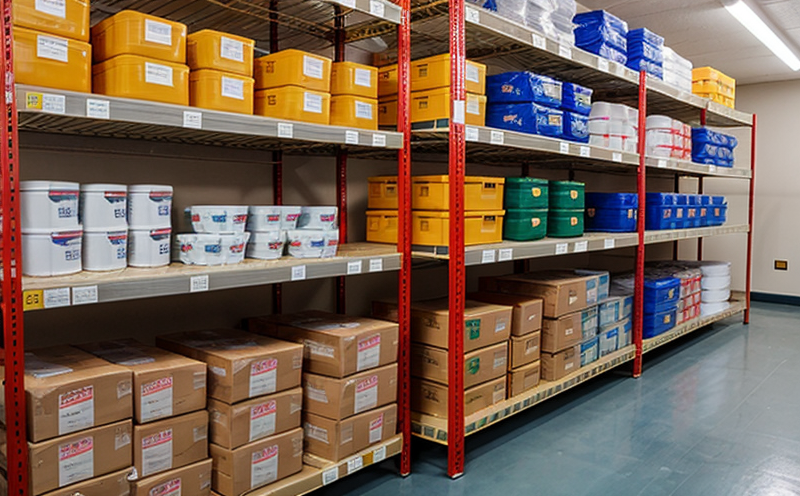ICH Q1C Stability of New Dosage Forms Testing
The International Conference on Harmonisation (ICH) guideline Q1C is specifically designed to ensure that pharmaceutical products retain their quality and efficacy over time. This guideline provides a framework for the stability testing of new dosage forms, which are formulations intended for oral administration such as tablets, capsules, or solutions. Stability testing under ICH Q1C ensures compliance with regulatory requirements and helps in securing approval from various health authorities worldwide.
The primary objective of this test is to determine the shelf-life of a drug product by exposing it to a range of environmental conditions that simulate real-world storage scenarios. These conditions include temperature, humidity, light exposure, and stability under stress conditions. By subjecting the dosage form to these environments, researchers can identify potential degradation pathways and understand the impact of various environmental factors on the integrity and potency of the drug.
The testing process involves several key steps:
- Initial Testing: Samples are prepared according to the specifications outlined in the product development documentation. These samples undergo initial stability studies at baseline conditions for a defined period, typically 6 months or longer.
- Stress Testing: Samples are exposed to extreme environmental conditions such as high temperature (40°C), high humidity (75% relative humidity), and accelerated light exposure. This helps in identifying potential degradation pathways early on during development.
- Long-Term Testing: Samples are stored under baseline conditions for a longer period, often 12 months or more, to simulate the expected shelf-life of the product.
The data collected from these tests is thoroughly analyzed using statistical methods. The aim is to establish a robust and reproducible shelf-life that can be used in marketing authorizations and regulatory submissions. Compliance with ICH Q1C ensures that the dosage form maintains its stability, safety, and efficacy over the expected storage period.
The importance of this testing cannot be overstated, especially for new dosage forms where there is limited historical data to guide formulation development. By adhering strictly to ICH Q1C guidelines, pharmaceutical companies can ensure that their products meet stringent regulatory standards and are safe for use by consumers worldwide.
Eurolab Advantages
Eurolab prides itself on offering comprehensive testing services tailored specifically to the demands of ICH Q1C stability testing. Our expertise in this area sets us apart from other laboratories, ensuring that clients receive accurate and reliable results within the required timelines.
- Accurate Testing: With state-of-the-art equipment and highly skilled professionals, we provide precise and consistent test results.
- Comprehensive Services: Eurolab offers a full range of stability testing services including initial testing, stress testing, and long-term storage studies. We also assist with data analysis and interpretation to ensure compliance with regulatory requirements.
- Timely Delivery: Our efficient processes allow us to deliver accurate results within the shortest possible timeframes.
- Regulatory Compliance: All our tests are conducted in accordance with ICH Q1C guidelines, ensuring that clients can submit their data confidently to regulatory authorities.
- Client Support: Our team of experts is always available to provide guidance and support throughout the testing process.
Eurolab's commitment to excellence ensures that our clients receive high-quality results that meet or exceed expectations. By choosing Eurolab, you are investing in a reliable partner who understands the complexities of pharmaceutical testing and can deliver on your needs.
Why Choose This Test
The ICH Q1C stability test is essential for several reasons:
- Regulatory Compliance: Compliance with ICH Q1C guidelines ensures that the product meets international standards and can be approved by various health authorities.
- Risk Management: By identifying potential degradation pathways early in development, the test helps manage risks associated with shelf-life stability.
- Patient Safety: Ensuring the stability of a dosage form is crucial for maintaining patient safety and efficacy.
- Market Access: Successful completion of this test can expedite market access by regulatory bodies.
- Data Integrity: Reliable data from these tests supports robust product development and quality assurance.
In addition to these benefits, the ICH Q1C stability test also provides valuable insights into the formulation's performance under various environmental conditions. This information is invaluable for optimizing the dosage form during development and ensuring long-term reliability.
Use Cases and Application Examples
- New Drug Applications: ICH Q1C stability testing is a crucial step in the approval process for new drug applications (NDAs).
- Generic Drug Development: This test ensures that generic drugs meet the same high standards as brand-name products.
- Product Lifecycle Management: Periodic stability tests help monitor product performance over its entire lifecycle.
- Formulation Optimization: The data from these tests can be used to refine and improve dosage form formulations.
- Market Expansion: Compliance with ICH Q1C helps expand market reach by securing approvals in multiple countries.
The results of the ICH Q1C stability test are vital for ensuring that pharmaceutical products remain safe, effective, and stable throughout their shelf-life. This is particularly critical for new dosage forms where there may be limited historical data to guide formulation development.





